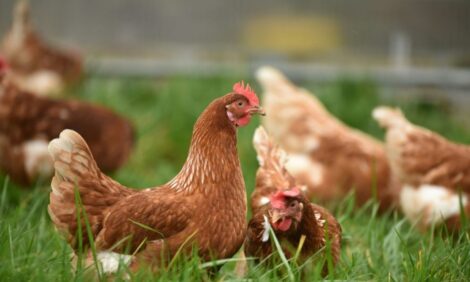



The Stress of Poultry Farming: Know How to Manage it
"Poultry farming can be a difficult, demanding and stressful occupation," say G. Tom Tabler and James P. Marshall of the University of Arkansas. In the latest issue of Avian Advice, they recommend ways to help combat stress in farmers and other farm workers. |
Introduction
It’s a hot August afternoon; chickens sell in 2 days but one of the sump pumps on the cool cell system just burned out. You get to the chicken house at 5:30 am and the feed lines and hoppers are running empty because something in the feed has locked up the cross auger. Does this sound familiar – and stressful?
Poultry farming can be a difficult, demanding and stressful occupation. In fact, agriculture is one of the most stressful of all occupations. That is partly because farmers and their families must cope with many forces, e.g. weather, livestock disease, equipment breakdowns etc., that are beyond their control (Daniels, 2006).
Thankfully, there are several things we can do to combat stress and live healthy and productive lives.
What is Stress?
Stress is a term that originated in the field of engineering, where it means a substance’s capacity to withstand strain (Weigel, 1983). However, stress is more complex when applied to human beings. One of the simplest definitions of stress in humans is “a state of physical and emotional arousal that is brought on by a stressor,” such as an equipment breakdown or a feed truck not delivering on time.
Stress is a normal part of everyone’s life. It affects all human systems simultaneously. Stress can accelerate the aging process. Dr Hans Selye refers to stress as the 'sum total of wear and tear on the body'. In fact, it is estimated that as many as 60 to 80 percent of doctor visits may be stress-related.
However, not all stress is bad. Good stress is called eustress, and it can increase our motivation to do our best and be successful. Bad stress is called distress, and it can negatively affect our health (Reynolds, 2008). When bad stress builds up over a period of time it is called cumulative stress and it can result in deteriorating performance, relationships and health.
Know the Signs
Stress affects people in a variety of different ways and what is worrisome to one person may not seem like a big deal to another. But there are some common signs and symptoms of stress that everyone should be aware of. These symptoms fall into one of four categories, and it is not uncommon to experience multiple symptoms from multiple categories simultaneously (Walker & Walker, 1987):
- Physical – headaches, ulcers, backaches, eating irregularities, sleep disturbances, frequent sickness, exhaustion
- Emotional – aadness, depression, bitterness, anger, anxiety, loss of spirit, loss of humour
- Cognitive – memory loss, lack of concentration, inability to make decisions
- Behavioural – irritability, backbiting, acting out, withdrawal, passive-aggression, substance abuse, violence.
If you are experiencing one or more of these symptoms, it may be due to the stress in your life and the way you are handling it. If you are stressed, it may be wise to consult your physician and/or try the powerful stress relieving ideas mentioned later in this article.
If you ignore these signs and symptoms of stress and let your stress levels go unchecked, a variety of potential problems may develop. Prolonged stress can lower the efficiency of your immune system, making you more susceptible to a wide range of illnesses (Walker and Walker, 1987). Also, be aware that many people under stress often forget about everyone else, becoming so wrapped up in their own problems that they start to snap at family and friends (Huhnke, 2007). Stress affects not only an individual but everyone close to that individual.
Stress and Poultry Farming
Studies comparing people’s stress levels and coping behaviour found that stress levels of farmers were significantly higher than non-farmers (Pitzer, 1987). Problem areas for farmers under stress include depression, over-eating, excessive caffeine intake, lack of physical exercise and a reluctance to seek professional help (Pitzer, 1987).
Farming is dangerous work, second only to the mining industry (National Safety Council, 2003). In 2003, 730 people died and 150,000 were permanently disabled by injuries sustained on farms and ranches in the United States (National Safety Council, 2003). The National Institute for Occupational Safety and Health found farm owners displayed a high incidence of stress-related diseases when compared to other occupations (Smith et al., 1977).
Many poultry producers work alone for extended periods and the work must get done even if that producer is sick or exhausted. This can increase stress levels and may affect concentration and safety practices. Producers should be aware of occupational hazards and avoid dangerous situations. Feed augers that can grab fingers and clothing, spinning fan blades, electrical motors and feed bin ladders are only a few of the dangers poultry producers face on a daily basis.
Equipment breakdowns can increase stress levels as well. When this happens, it is best to just relax, take a couple of deep breaths and assess the situation. This can be difficult to do, especially when you are in a hurry to fix the problem. However, if you think through your strategy beforehand you can improve your thought process and get more done in less time.
Stress and Gender
Stress affects both men and women but it may be even greater for farm women. That’s because they may experience additional stressors compared to their male counterparts. Many farm women have full responsibility for household tasks (which often go unnoticed) in addition to being a full partner in the farm business or holding down an off-farm job (Reynolds, 2008).
Fortunately, there are several organizations that offer support and assistance for women in agriculture. Arkansas Women in Agriculture is a private non-profit organization that provides both educational programs for women involved in agriculture in Arkansas, and a network with other Arkansas women involved in agricultural community issues, as well as identifying new ways to balance the demands of family, community and professional life.
Other national organizations such as Women in Blue Jeans and Women in Denim have similar purposes. Programs such as Annie’s Project seek to address the challenges that women face as farm owners and business partners in agricultural operations, and arm them with the tools to succeed in their operations.
General stresses that women experience in society may be particularly acute for women in male-dominated fields such as agriculture. These stresses include agricultural stereotypes, women’s lack of perceived authority for farm management, gender roles and stereotypes at home and in public, and lack of access to agricultural programs and loans (Reynolds, 2008).
Managing Stress and Living Well
Three of the best things anyone can do to manage the stress in their life and live healthier include:
- Eating sensible amounts of healthy food (and eating regular meals) ,
- Participating in some type of physical activity at least 30 minutes a day 5-6 times a week and
- Going to bed and waking up at about the same time every day, allowing for 7-8 hours of sleep.
A well managed diet, regular exercise, and adequate sleep are proven strategies for fighting stress and depression.
In addition to the ideas mentioned above, there are several more proven ways to lower stress and live better. The science of happiness and well-being has progressed enough that we have identified seven things all of us can do that will improve the quality of our lives. The healthier and happier we are, the better we will be able to function.
The University of Arkansas Cooperative Extension Service has summarized these seven keys of well-being in a publication called The Personal Journey (Goddard & Marshall, 2006).
- Enjoy today - In the hike of life, we can focus on the obstacles along the trail or the beauty that surrounds us. Those who find the beauty in daily life travel well. The old adage is true--happiness comes from wanting what you get more than getting what you want. We are more likely to be happy when we think about all the good things in our lives rather than worrying about all the things we wish we had.
- Find the gems in your past - Anyone who wants to find a gem must be willing to search for it. Likewise, we find treasures in our life stories when we are willing to dig through challenges and disappointments to find them. Those who find and cherish the gems in their past are those who live the best lives. Some gems jump right out at us, but others take some time to find and to polish. Quite often, today’s gems were yesterday’s trials and difficulties. It is only through the lens of our personal growth and perspective that we can now see diamonds in what we once thought were ugly lumps of coal. Most of us have had disappointment and pain in our life histories and they sometimes burden us. They may even affect how we see ourselves and our lives. One of the surprising discoveries of modern psychology is that bad events in our past (childhood) don’t have to lead to or cause a bad adult life. We need not be held hostage to our past. We can “rewrite our history with forgiveness” - that is, we can go back through the bad experiences of our lives and offer compassion and understanding to those who hurt us. We can also choose to find the good in our past and emphasize that. We can celebrate our own abilities to survive and thrive in an imperfect world.
- Look forward to tomorrow - People who are excited and hopeful about the future are likely to have better journeys. Those who look for and expect to find good things usually do. Who knows what great things will happen tomorrow! Some of us look to the future with anxiety and apprehension. We worry about what may or may not happen. Constant worrying is not good for the human soul. People who have a steady optimism are more likely to thrive than those who worry and fret.
- Use your strengths - Each person has strengths and weaknesses. The greatest joy and progress come from using our strengths while managing our weaknesses. We discover our strengths by noticing what we love to do-those things that challenge us and get us so engaged that we lose track of time. Many of us fret endlessly about our weaknesses. We regularly come up with self-improvement programs to overcome this weakness, but these efforts may not be very productive. Psychologist Martin Seligman (2002) has said that we should not devote too much energy to correcting our weaknesses. Rather, he believes that the highest success in living and the deepest emotional satisfaction comes from building on and using our signature strengths.
- Choose to serve - Psychologists have found that people who use their strengths and abilities to make the world a better place are happier than those who do not. When we focus primarily on our selves our view of the world is narrow and limited. As we turn more energy and attention to helping others, the meaning and satisfaction of our own lives expand. There are countless places and ways we can serve others.
- Choose to grow - Growth is the surest sign of progress in life. Seeking new ideas, experiences, and projects helps us grow and enjoy our journey. When we challenge ourselves to keep reading, listening, and learning, our lives are more full and rich. Happiness is a way of traveling more than a place to go. When we travel the trails of life eager to learn and grow, we will travel well.
- Don’t Forget Your Compass! - Each of us is equipped with a personal compass-or conscience-to guide us along life’s journey. Conscience is the peaceful voice inside of us that invites us to be compassionate, kind, and honorable. When we ignore the compass, we get lost. When we use our compass well, our journey will be richer and more meaningful.
Try the principles described above and see if they don’t decrease the stress you feel and increase the light and energy in your life!
Summary and Conclusions
Poultry farming is a stressful occupation, e.g. heat in summer, high fuel bills in winter, disease outbreaks, equipment breakdowns etc., and many farmers push themselves too hard. But just because stress is an unavoidable part of farming does not mean it is unmanageable.
Proven techniques can help reduce stress and make our lives happier as well as more productive. Many of you may already be excellent in most of the areas mentioned. Celebrate the parts of your life that are satisfying! If there is an area where you would like to do better, make a plan.
References
Daniels, A.M. 2006. Farming, Ranching and Stress: It’s a Family Issue. #1: Stress and the Farm or Ranch Family. Extension Extra #14058. South Dakota State University Cooperative Extension Service.
Goddard, H.W. & J.P. Marshall. 2006. The personal journey. University of Arkansas Division of Agriculture, Cooperative Extension Service. http://www.arfamilies.com/ family_life/personal/default.htm Visited 9/18/08.
Huhnke, R.L. 2007. Stress on the farm. Agricultural Safety and Health Series. Pub. # BAE-1720. Oklahoma State University Cooperative Extension Service.
National Safety Council. 2003. Accident facts: 2003 edition. Itasca, IL.
Pitzer, R. 1987. Stress and coping on the farm. University of Minnesota Extension Service. Online publication: www. extension.umn.edu. Accessed 7/29/08
Reynolds, K. 2008. Stress management for women farmers and ranchers. UC Small Farm Program Publication. Agriculture and Natural Resources. University of California. Seligman, M. E. P. 2002. Authentic Happiness. Free Press: New York.
Smith, M.J., M.J. Colligan and J.J. Hurrell. 1977. A review of NIOSH psychological stress research-1977. Proceedings of the Conference on Occupational Stress, pp 26- 36. Los Angeles, CA. Nov 3.
Walker, J.L. and L.J. Walker. 1987. The human harvest: Changing farm stress to family success. Brandon University. Brandon, Manitoba, Canada.
Weigel, R. 1983. Stress on the Farm. North Central Regional Extension Pub. 192a. Iowa State Univ.








